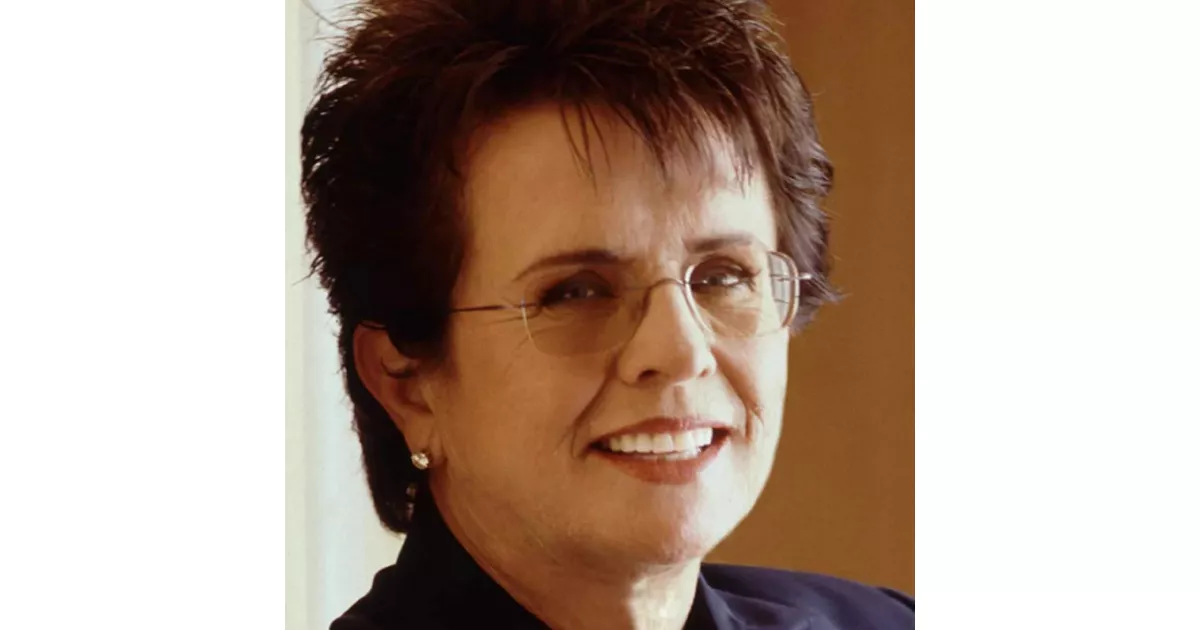Life is full of challenges, and Billie Jean King faced many. Discover key struggles and how they were overcome.
Billie Jean King, a former world No. 1 American tennis player, secured 39 Grand Slam titles across singles, women's doubles, and mixed doubles. King's contributions extended to team victories, representing the United States in seven Federation Cups and nine Wightman Cups. Beyond her athletic achievements, she has been a prominent figure in advocating for gender equality in sports and society.
1963: Wimbledon Final Loss to Margaret Court
In 1963, Billie Jean King faced Margaret Court in the Wimbledon final, where Court prevailed, marking a significant match in their rivalry.
1965: First year without a Grand Slam title since 1965
In 1969, it marked the first year since 1965 that Billie Jean King did not win at least one Grand Slam singles title.
1967: King criticizes USLTA's "shamateurism"
In 1967, King criticized the United States Lawn Tennis Association (USLTA) for its practice of "shamateurism," where top players were paid under the table, arguing that this kept the game elitist. This positioned King as a force in the opening of tennis to professionalism.
1968: Australian Championships win and knee surgery
In early 1968, Billie Jean King won three consecutive tournaments in Australia, including the Australian Championships. She continued winning upon her return to the United States and then in Europe. She won her third consecutive Wimbledon singles title. On September 24, 1968, she had surgery to repair cartilage in her left knee.
May 1969: Knee Recovery
After undergoing knee surgery in September 1968, Billie Jean King said that it took eight months, until May 1969, for her knee to recover completely from the surgery.
1969: Australian Open Final and Tournament Wins
In 1969, Billie Jean King participated in the Australian summer tour but did not win a tournament. She lost in the Australian Open final to Margaret Court. She later won the Pacific Coast Pro and the Los Angeles Pro, as well as two tournaments in South Africa. She reached the Wimbledon final but lost to Ann Haydon-Jones and lost in the quarterfinals of the US Open. This was the first year since 1965 that King did not win at least one Grand Slam singles title. She finished the year with titles at the Pacific Southwest Open in Los Angeles, the Stockholm Indoors, and the Midland (Texas) Pro.
September 1970: Pacific Southwest Open and Women's Rights Advocacy
In September 1970, Billie Jean King advocated for better pay for female tennis players. At the Pacific Southwest Open, the prize money for men was significantly higher than for women, leading King and other women to boycott the tournament and organize the women-only Houston Virginia Slims invitational. This helped launch a series of women-only tournaments.
1971: Court Misses Significant Portions of the year
In 1971, Margaret Court missed significant portions of the year due to childbirth. Court's 1973 season was her first full season since winning the Grand Slam in 1970, as she had missed significant portions of 1971 and 1972 due to childbirth.
1971: Loss to Christine Truman Janes and Rothmans North of England Championships Win
In early May 1971, Billie Jean King lost to Christine Truman Janes at Hurlingham, United Kingdom, but won the German Open in Hamburg. She lost to Margaret Court at the Queen's Club tournament in London and lost in Wimbledon semi-finals. She won the Rothmans North of England Championships.
1972: King wins US Open but receives less prize money than male champion
In 1972, King won the US Open but received US$15,000 less than the men's champion Ilie Năstase. She threatened to boycott the next year if the prize money was not equal.
1972: Court Misses Significant Portions of the year
In 1972, Margaret Court missed significant portions of the year due to childbirth. Court's 1973 season was her first full season since winning the Grand Slam in 1970, as she had missed significant portions of 1971 and 1972 due to childbirth.
1972: Early Season Losses and Admission of Cramps
In early 1972, Billie Jean King admitted that cramps associated with an abortion caused her to retire from a match with Chris Evert in St. Petersburg.
1973: Margaret Court's Dominance and King's Inconsistency
In 1973, Margaret Court dominated by winning three Grand Slam singles titles and was ranked world No. 1. Billie Jean King started the year inconsistently, missing tournaments due to a wrist injury. King defeated Court at the Virginia Slims of Indianapolis, ending Court's winning streak, but struggled in subsequent tournaments, losing twice to Court.
1973: Battle of the Sexes
In 1973, at the age of 29, Billie Jean King won the "Battle of the Sexes" tennis match against 55-year-old Bobby Riggs. She also founded the Women's Tennis Association and the Women's Sports Foundation and helped persuade Virginia Slims to sponsor women's tennis.
1974: King's Victories and Setbacks
In 1974, Billie Jean King won five of the first seven tournaments she contested, including the Virginia Slims of San Francisco and the U.S. Indoor Championships, but had some upsets, including losses to Olga Morozova at Philadelphia and Wimbledon. She won her fourth US Open singles title.
November 1976: King Undergoes Knee Surgery
In November 1976, Billie Jean King had her third knee surgery, this time on her right knee.
1976: King's Doubles Play and Knee Surgery
In 1976, Billie Jean King focused on doubles and mixed doubles, winning the mixed doubles title at the US Open. She underwent knee surgery in November.
1977: Evert Defeats King at Wimbledon
In 1977 at Wimbledon, Chris Evert defeated Billie Jean King for the first time at a Grand Slam singles tournament. It was also the first time King competed at Wimbledon and did not reach a final.
1977: Doctors' Prediction
In 1977, Billie Jean King recalled that doctors predicted in 1968 that her left knee would only allow her to play competitive tennis for two more years.
December 1978: King's Foot Surgery
In December 1978, Billie Jean King underwent major surgery on her left foot, leading to limited play in 1979.
1978: King's Doubles Success and Foot Surgery
In 1978, Billie Jean King teamed with Navratilova to win the women's doubles title at the US Open. She also participated in the Federation Cup and Wightman Cup. She hinted at retirement from major singles competitions and had foot surgery in December.
1979: King's Limited Play After Surgery
In 1979, Billie Jean King played only one event, doubles in the Federation Cup tie against Spain, due to her foot surgery in December 1978.
1979: Kings ask Barnett to leave their house
In 1979, the Kings asked Barnett to leave their house, but she refused and threatened to leak sensitive documents.
1980: King Fails to Reach a Final at Wimbledon
In 1980, Billie Jean King competed at Wimbledon but did not feature in a final. The only other years she competed at the championship and did not feature in a final were 1980 and 1982.
1980: King at the French Open
In 1980, Billie Jean King played at the French Open for the first time since winning in 1972, losing in the quarterfinals.
May 1981: Barnett sues the Kings
In May 1981, Marilyn Barnett sued the Kings in a palimony lawsuit after a suicide attempt. Billie Jean acknowledged the relationship shortly afterward, causing her to lose endorsements.
December 1981: Court Order for Barnett to Leave House
In December 1981, a court order stipulated that Barnett leave the house. Barnett's threats to publish private correspondence between her and King in exchange for money were considered close to extortion.
November 1982: Barnett's Palimony Suit Dismissed
In November 1982, Barnett's palimony suit was thrown out of court.
1982: King Fails to Reach a Final at Wimbledon
In 1982, Billie Jean King competed at Wimbledon but did not feature in a final. The only other years she competed at the championship and did not feature in a final were 1980 and 1982.
Mentioned in this timeline

Sir Elton John is a highly successful British singer songwriter...

Barack Obama the th U S President - was the...
California is a U S state on the Pacific Coast...
Sports Illustrated SI is an American sports magazine launched in...
New Zealand is an island country located in the southwestern...

Los Angeles is the most populous city in California and...
Trending

9 months ago Scott Galloway Proposes Social Security Fix: Impact and Billionaire Benefits Analyzed
4 months ago Russian Airstrikes in Ukraine Kill Six, Putin-Trump Talks Shelved Amid Escalation.
9 months ago Estonia Strengthens Defense With HIMARS, Honors Veterans, and Prepares for Live Fire Training.

10 months ago Alex Bowman Scores Pole at Bristol, Suffers Engine Failure During NASCAR Cup

2 months ago Billy Crudup Speaks About Mary-Louise Parker Breakup and Co-Parenting Relationship
Virginia officially the Commonwealth of Virginia is a state located in the Southeastern and Mid-Atlantic regions of the United States...
Popular

Kid Rock born Robert James Ritchie is an American musician...

Melania Trump a Slovenian-American former model has served as First...

XXXTentacion born Jahseh Dwayne Ricardo Onfroy was a controversial yet...

Thomas Douglas Homan is an American law enforcement officer who...
The Winter Olympic Games a major international multi-sport event held...

Instagram is a photo and video-sharing social networking service owned...
